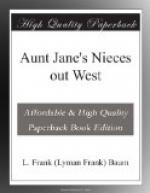He paused to look around him questioningly and the interest on every face was clearly evident. Arthur took this opportunity to introduce Jones to Louise and Beth and then they all sat down again. Said Uncle John to the stranger, in his frank and friendly way:
“Tell us as much or as little as you like, my boy. We are not unduly inquisitive, I assure you.”
“Thank you, sir. I am an American, and my name is Jones. That is, I may claim American parentage, although I was born upon a scarcely known island in the Pacific which my father purchased from the government of Uruguay some thirty years ago.”
“Sangoa?” asked Arthur.
He seemed surprised at the question but readily answered:
“Yes; Sangoa. My father was a grandnephew of John Paul Jones and very proud of the connection; but instead of being a sailor he was a scientist, and he chose to pass his life in retirement from the world.”
“Your father is no longer living, then?” said Mr. Merrick.
“He passed away a year ago, on his beloved island. My mother died several years before him. I began to feel lonely at Sangoa and I was anxious to visit America, of which my mother had so often told me. So some months ago I reached San Francisco, since when I have been traveling over your country—my country, may I call it?—and studying your modern civilization. In New York I remained fully three months. It is only about ten days since I returned to this coast.”
He stopped abruptly, as if he considered he had told enough. The brief recital had interested his auditors, but the ensuing pause was rather embarrassing.
“I suppose you have been visiting relatives of your parents,” remarked Uncle John, to ease the situation.
“They—had no relatives that I know of,” he returned. “I am quite alone in the world. You must not suppose I am unaccustomed to the water,” he hastened to add, as if to retreat from an unpleasant subject. “At Sangoa I have bathed in the sea ever since I can remember anything; but—I am not in good health. I suffer from indigestion, a chronic condition, which is my incubus. Yesterday my strength suddenly deserted me and I became helpless.”
“How fortunate it was that Maud noticed you!” exclaimed Patsy, with generous sympathy.
Again the half sad smile softened his face as he looked at her.
“I am not sure it was wholly fortunate for me,” he said, “although I admit I have no wish to end my uninteresting life by drowning. I am not a misanthrope, in spite of my bad stomach. The world is more useful to me than I am to the world, but that is not my fault. Pardon me for talking so much about myself.”
“Oh, we are intensely interested, I assure you,” replied Patsy. “If some of us were indeed the instruments that saved you yesterday, it is a pleasure to us to know something of the—the man—we saved.”
She had almost said “boy,” he was such a youthful person, and he knew it as well as she did.




